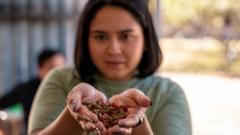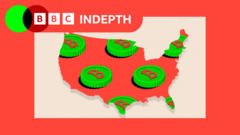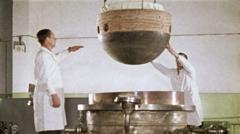In the heart of Honduras, a burgeoning green business is turning the tide on waste management through an innovative reuse approach. Led by the dynamic 27-year-old Hugo Daniel Chávez, project manager for the NGO Sustenta Honduras, the initiative harnesses the immense quantity of used cooking oil generated by the nation’s deep-fried food culture and converts it into useful products like soap and dog food. "We aim to revitalize waste into something beneficial,” Chávez states proudly.
Amid the backdrop of Latin America, where millions of tonnes of cooking oil are consumed annually, the problem of waste management looms large. Improper disposal can lead to severe health hazards and environmental degradation, contaminating waterways and affecting local agriculture. In tackling this conundrum, Sustenta introduced an eco-entrepreneurial initiative to incentivize businesses and households to responsibly dispose of their used cooking oil instead of selling it on the black market.
Drawing inspiration from previous biodiesel projects, the NGO's executive director, Ricardo Pineda, reveals that they shifted focus to create products that hold promise in domestic markets. "We decided to produce items like soap and dog food that fulfill local demand, instead of competing in the biodiesel sector,” he explains. To support this vision, Sustenta arranges regular pickups of used cooking oil from participating shops, compensating them at rates ranging from 2.50 to 3.50 Lempiras per pound.
Their impact has attracted global attention, earning a $20,000 prize as a winner of the 2023 Youth4Climate Energy Challenge, which acknowledges innovative solutions to climate issues. Additionally, they receive backing from the Dutch Embassy, commending Sustenta’s commitment to creating a circular economy that fosters social empowerment, particularly among youth and women—a demographic significantly impacted by climate change.
In a game-changing alliance, Sustenta secured a contract with Walmart’s Central American division, ensuring a consistent supply of used cooking oil from affiliated companies. As Pineda highlights, "This partnership was crucial for our project’s growth, providing essential resources to scale operations."
The transformation process occurs in a facility located in Comayagua, where the collected oil undergoes purification and is combined with alkalis through saponification to yield soap. Their production model emphasizes a circular ecological system, effectively utilizing water waste from an adjacent purification plant for cooling in their processes.
Pricing their soap at approximately 15 Lempiras, the initiative generates a monthly revenue exceeding 106,000 Lempiras, fueling further growth. However, Pineda reiterates that profits are reinvested into the project rather than enriching the organization itself.
As a collective of young individuals—averaging 23 years old—Sustenta embodies a refreshing paradigm in the environmental sector, contrasting older, adversarial approaches. Pineda expresses the conviction: "We are eager to craft real solutions rather than just critique prevailing systems," while project coordinator Paola Acevedo recognizes the complementary nature of their work alongside traditional environmental advocacy.
With multiple projects ongoing, Sustenta’s success in recycling used cooking oil serves as a testament to the potential for transformative change through innovation and collaboration.
Amid the backdrop of Latin America, where millions of tonnes of cooking oil are consumed annually, the problem of waste management looms large. Improper disposal can lead to severe health hazards and environmental degradation, contaminating waterways and affecting local agriculture. In tackling this conundrum, Sustenta introduced an eco-entrepreneurial initiative to incentivize businesses and households to responsibly dispose of their used cooking oil instead of selling it on the black market.
Drawing inspiration from previous biodiesel projects, the NGO's executive director, Ricardo Pineda, reveals that they shifted focus to create products that hold promise in domestic markets. "We decided to produce items like soap and dog food that fulfill local demand, instead of competing in the biodiesel sector,” he explains. To support this vision, Sustenta arranges regular pickups of used cooking oil from participating shops, compensating them at rates ranging from 2.50 to 3.50 Lempiras per pound.
Their impact has attracted global attention, earning a $20,000 prize as a winner of the 2023 Youth4Climate Energy Challenge, which acknowledges innovative solutions to climate issues. Additionally, they receive backing from the Dutch Embassy, commending Sustenta’s commitment to creating a circular economy that fosters social empowerment, particularly among youth and women—a demographic significantly impacted by climate change.
In a game-changing alliance, Sustenta secured a contract with Walmart’s Central American division, ensuring a consistent supply of used cooking oil from affiliated companies. As Pineda highlights, "This partnership was crucial for our project’s growth, providing essential resources to scale operations."
The transformation process occurs in a facility located in Comayagua, where the collected oil undergoes purification and is combined with alkalis through saponification to yield soap. Their production model emphasizes a circular ecological system, effectively utilizing water waste from an adjacent purification plant for cooling in their processes.
Pricing their soap at approximately 15 Lempiras, the initiative generates a monthly revenue exceeding 106,000 Lempiras, fueling further growth. However, Pineda reiterates that profits are reinvested into the project rather than enriching the organization itself.
As a collective of young individuals—averaging 23 years old—Sustenta embodies a refreshing paradigm in the environmental sector, contrasting older, adversarial approaches. Pineda expresses the conviction: "We are eager to craft real solutions rather than just critique prevailing systems," while project coordinator Paola Acevedo recognizes the complementary nature of their work alongside traditional environmental advocacy.
With multiple projects ongoing, Sustenta’s success in recycling used cooking oil serves as a testament to the potential for transformative change through innovation and collaboration.






















